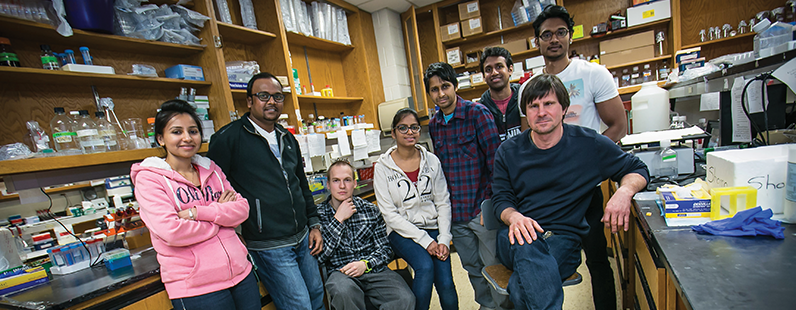Posted on March 16, 2017 at 4:37 PM, updated March 23, 2017 at 10:10 AM Print
Group led by Roman Kondratov receives NIH renewal to further research

A research team in Cleveland State University’s Center for Gene Regulation in Health and Disease is helping to unravel the mysteries of aging and develop better therapies to address age related illnesses. The team, led by Roman Kondratov, a professor of biological sciences at CSU, has been awarded an R01 renewal grant from the National Institute of Aging, within the National Institutes of Health, to study the impact of diet on the body’s natural circadian rhythms and the master circadian clock that controls them. Data obtained as a result of this study will help to understand the molecular basis of aging and to develop physiological and pharmacological strategies for the treatment and prevention of age-associated diseases.
“Over the last decade, research has found that dietary restriction (i.e., reducing calorie intake without malnutrition) is a powerful intervention for increasing longevity in a variety of organisms,” says Kondratov. “Specifically, calorie restriction may reduce the occurrence of age-associated illnesses, including osteoporosis, and Parkinson’s disease. In contrast, disruption of the body’s natural circadian rhythms through bad diet has been associated with the negative effects of aging on physiology, metabolism, and behavior.”
Kondratov and his associates have uncovered biochemical clues to how these opposing mechanisms may function. The team is studying the master circadian clock, located in the hypothalamus region of the brain and modeling how the clock controls and coordinates the function of diverse organs and synchronizes bodily activities with the environment. They are also assessing how varying diet, including both calorie amount and timing of caloric intake, impacts circadian function.
“Our previous research indicates that calorie restriction and bad diet disrupt the circadian system and can lead to accelerated aging and a reduced lifespan,” adds Kondratov. “This next study will seek to better understand how dietary changes impact biochemical function and the potential therapies that can be used to correct the negative effects we have documented.”
###

